人教版五年级英语下册各单元知识点
人教版小学英语五年级下册各单元知识点

人教版小学英语五年级下册各单元知识点Unit 1 At the zooVocabulary1.zoo 动物园2.cage 笼子3.lion 狮子4.elephant 大象5.giraffe 长颈鹿6.bear 熊7.monkey 猴子8.camel 骆驼9.kangaroo 袋鼠10.penguin 企鹅Sentence patterns1.询问动物去哪里了 Where is the lion/elephant/bear?2.描述动物在哪里There’s a lion/elephant/bear in the cage.3.描述动物是什么样的 What does the lion/elephant/bear look like?4.描述动物在做什么 The monkey is jumping./The camel is walking. Unit 2 My school dayVocabulary1.school day 学校日2.subject 学科3.math 数学4.English 英语5.science 科学6.PE 体育7.art 美术8.music 音乐9.Chinese 语文Sentence patterns1.询问你有哪些学科 What subjects do you have?2.询问你最喜欢的学科是什么What’s your favorite subject?3.描述你正在上什么学科I’m having math/English/science class now.4.询问你在哪个班级 What class are you in?Unit 3 At a partyVocabulary1.party 派对2.balloon 气球3.present 礼物4.birthday 生日5.cake 蛋糕6.candle 蜡烛7.card 卡片Sentence patterns1.询问你们在庆祝什么 What are you celebrating?2.询问你送了什么礼物 What present did you bring?3.描述蛋糕上有多少个蜡烛 There are four candles on the cake.4.描述你在派对上吃了什么 I ate cake and drank soda.Unit 4 My clothesVocabulary1.clothes 衣服2.jacket 夹克衫3.shirt 衬衫4.dress 连衣裙5.skirt 短裙6.pants 裤子7.socks 袜子8.shoes 鞋子Sentence patterns1.询问你喜欢穿什么样的衣服 What clothes do you like to wear?2.询问今天你穿了什么衣服 What clothes are you wearing today?3.描述你的外套是什么样的 My jacket is blue.4.描述你的鞋子是什么颜色的 My shoes are red.Unit 5 My familyVocabulary1.family 家庭2.mother 母亲3.father 父亲4.sister 姐妹5.brother 兄弟6.grandmother 奶奶7.grandfather 爷爷8.aunt 阿姨9.uncle 叔叔Sentence patterns1.询问你有几口人家庭 How many people are there in your family?2.询问你和家人一起住吗 Do you live with your family?3.描述你的妈妈是什么样的 My mother is kind.4.描述你和兄弟姐妹的关系很好 My sister and I get along well.。
新人教版PEP 【小学五年级英语下册】 单元知识点 归纳总结

新人教版PEP 【小学五年级英语下册】单元知识点归纳总结Unit 1 My DayIn this unit。
we learn some core vocabulary words。
phrases。
and XXX.Core Vocabulary:1.Verbs: take (studying)。
go to (class)2.Nouns: dancing。
exercise。
sports3.Phrases: do morning exercises。
eat breakfast。
play sports。
eat dinner。
go for a walk。
go shopping。
clean my room。
take a dancing class。
have a classXXX Vocabulary:1.Verbs: start。
shop。
work。
need。
live。
win。
sound2.Nouns: Spain。
play。
letter。
island。
cave3.ns: after4.XXX: when。
XXX。
a.m。
p.m。
why。
last。
also。
busy5.nal Vocabulary: frequency adverbs (always。
usually。
sometimes)Phrases:watch TV。
eat lunch。
go to bed。
go swimming。
go home。
go to schoolCore Sentence Structure:When do you do morning exercises?" "At 7 o'clock."XXX phrase is "good job" to praise XXX.Which season do you like best。
I like winter best。
This sentence means "which one do you like the most" and "like。
【口袋书】人教版PEP五年级下册英语 基础知识汇总

人教版PEP五年级下册基础知识汇总Unit 1 My day.重点单词:[四会]dancing 跳舞;舞蹈exercise 活动;运动take 学习;上(课)[三会]after 在(时间)后start 开始usually 通常地;惯常地Spain 西班牙late 晚;迟a.m.午前;上午p.m.午后;下午why 为什么shop 去买东西;购物work 工作last 上一个的;刚过去的sound 听起来好像also 还;也busy 忙的need 需要play 戏剧;剧本letter 信live 居住island 岛always 总是;一直cave 山洞;洞穴win 获胜重点短语:eat breakfast 吃早饭have … class 上…课play sports 进行体育运动do morning exercises 做早操eat dinner 吃晚饭clean my room 打扫我的房间go for a walk 散步go shopping 去买东西;购物take a dancing class 上舞蹈课go swimming 去游泳start class 开始上课last night 昨天晚上after lunch 午饭以后a lot of fun 许多乐趣live on an island 住在一座岛上be good at sports 擅长体育运动字母组合cl 发/kl/ 音:clean 打扫clock 钟class 课;班级clever 聪明的clock 钟字母组合pl 发/pl/ 音:plate 盘子;碟子eggplant 茄子please 请play 玩耍;戏剧重点句型:1.询问别人什么时候做某事的问句及回答:-- When do/does + 主语+ 动词(短语)原形(+ 其他)?-- 主语(+ 频度副词)+ 动词(短语)原形/ 第三人稀单数形式+ at + 具体时间/ At + 具体时间.-- When do you get up? 你什么时候起床?-- I get up at 5 o'clock. 我5点起床。
人教版PEP小学英语五年级下册知识点汇总(最新)
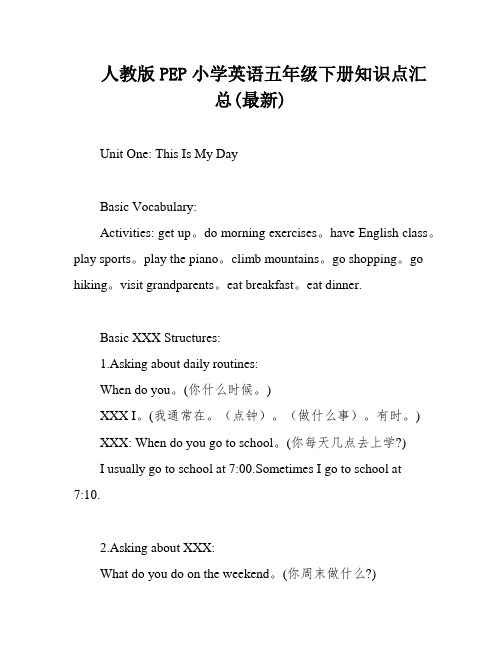
人教版PEP小学英语五年级下册知识点汇总(最新)Unit One: This Is My DayBasic Vocabulary:Activities: get up。
do morning exercises。
have English class。
play sports。
play the piano。
climb mountains。
go shopping。
go hiking。
visit grandparents。
eat breakfast。
eat dinner.Basic XXX Structures:1.Asking about daily routines:When do you。
(你什么时候。
)XXX I。
(我通常在。
(点钟)。
(做什么事)。
有时。
)XXX: When do you go to school。
(你每天几点去上学?)I usually go to school at 7:00.Sometimes I go to school at7:10.2.Asking about XXX:What do you do on the weekend。
(你周末做什么?)XXX I。
(我通常/经常。
有时。
)XXX: What do you do on the weekend?I often play XXX I go shopping with my mom.3.Introducing one's own habits:Every weekend。
I go hiking。
(我每个周末远足。
)Every day。
I do my homework at 8:00 in the evening。
(我每天晚上8点做作业。
)4.Asking XXX:What do you do。
(你是干什么的?)Time:morning。
afternoon。
evening。
noon。
at night。
6:00.on Sunday。
人教版PEP小学英语五年级下册知识点汇总(最新)
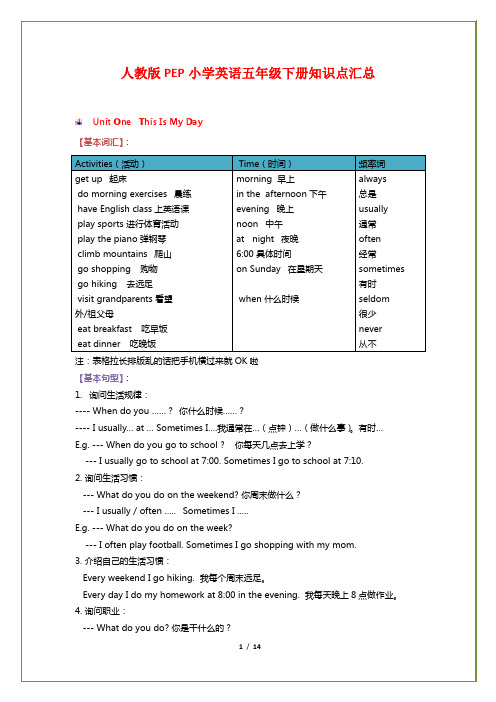
人教版PEP小学英语五年级下册知识点汇总Unit One This Is My Day【基本词汇】:Activities(活动) Time(时间)频率词get up 起床do morning exercises 晨练 have English class上英语课 play sports 进行体育活动 play the piano 弹钢琴climb mountains 爬山go shopping 购物go hiking 去远足visit grandparents 看望外/祖父母eat breakfast 吃早饭eat dinner 吃晚饭morning 早上in the afternoon下午evening 晚上noon 中午at night 夜晚6:00 具体时间on Sunday 在星期天when 什么时候always总是usually通常often经常sometimes有时seldom很少never从不注:表格拉长排版乱的话把手机横过来就OK啦【基本句型】:1. 询问生活规律:---- When do you ……?你什么时候……?---- I usually… at …Sometimes I….我通常在…(点钟)…(做什么事)。
有时…E.g. --- When do you go to school ? 你每天几点去上学?--- I usually go to school at 7:00. Sometimes I go to school at 7:10.2. 询问生活习惯:--- What do you do on the weekend? 你周末做什么?--- I usually / often ….. Sometimes I …..E.g. --- What do you do on the week?--- I often play football. Sometimes I go shopping with my mom.3. 介绍自己的生活习惯:Every weekend I go hiking. 我每个周末远足。
人教版英语五年级下四单元知识点-Unit 4 Last weekend
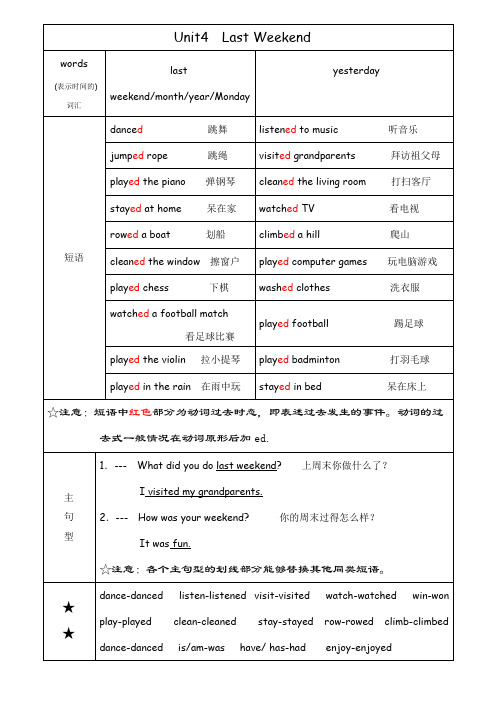
watcheda football match
看足球比赛
playedfootball踢足球
playedthe violin拉小提琴
playedbadminton打羽毛球
playedin the rain在雨中玩
stayedin bed呆在床上
☆注意:短语中红色部分为动词过去时态,即表述过去发生的事件。动词的过
Unit4Last Weekend
words
(表示时间的)词汇
last
weekend/month/year/Monday
yesterday
短语
danced跳舞
listenedto music听音乐
jumpedrope跳绳
visitedgrandparents拜访祖父母
playedthe piano弹钢琴
cleanedthe living room打扫客厅
stayedat home呆在家
watchedTV看电视
roweda boat划船
cБайду номын сангаасimbeda hill爬山
cleanedthe window擦窗户
playedcomputer games玩电脑游戏
playedchess下棋
washedclothes洗衣服
去式一般情况在动词原形后加ed.
人教版新起点英语五年级下册全册单元知识点

Unit 1 Keep Healthy(保持健康)一、单元词汇too much 太多candy 糖果go to bed 去睡;就寝early 早exercise 锻炼tired 困倦的;疲倦的drink 喝;饮before 在......之前dirty 肮脏的always 总是stomachache 胃疼headache 头疼toothache 牙痛a lot of 大量;许多sleepy 困的;欲睡的subject 学科mark 分数advice 建议more 更多的二、单元句型1. A: What s wrong? 怎么了?B: I ve got a stomachache. 我肚子疼。
2. A: I often have stomachaches. What should I do?我经常肚子疼。
我应该怎么办?B: You should drink some water. 你应该喝些水。
3. Here you are. 给你。
4. A: Do you eat a lot of candy? 你吃了很多糖吗?B: Yes, I eat some after every class. 是的,我每节课后都吃很多。
5. You shouldn t eat too much candy. 你不该吃太多糖。
6. A: Do you wash your hands before eating? 你饭前洗手了吗?B: Not always. 不总洗。
7. You shouldn t eat with dirty hands. 你不该用脏手吃饭。
8. You should always wash your hands before eating.你应该坚持饭前洗手。
9. I always feel tired and sleepy. 我总觉得很累很困。
10. I have some advice for you. 我给你一些建议。
人教精通版五年级英语下册全册知识点总结

人教精通版五年级英语下册全册知识点总结知识点总结Unit 1 Welcome to our school!【词汇】library 图书馆borrow (向某人、从某人)借borrow books 借书meeting room 会议室have a meeting 开会welcome 欢迎meet 相遇;开会our 我们的science lab 科学实验室science lesson 科学课language lab 语言实验室English lesson 英语课we 我们have 有all 所有;全部like 喜欢very much 非常;很art club 美术(艺术)俱乐部paint a picture (用颜料)绘画music club 音乐俱乐部play the piano 弹钢琴many 许多music 音乐way 路;道路please 请also 也;同样【句型】1. We\\\\\\\\\'ll show you around our school. 我们会带你参观我们学校。
2. Look! This is our library. 看!这是我们的图书馆。
3. —Do you often come to the library?你经常去图书馆吗?—Yes. We often borrow books from the library.是的。
我们经常从图书馆借书。
4. This way, please. This is our meeting room.这边请。
这是我们的会议室。
5. Welcome to our school. 欢迎来到我们学校。
6. —How many science lessons do you have in a week?你们一周有多少实验课?—We have two. 两节。
7. —Do you like English? —Yes. We all like it.你喜欢英语吗?喜欢。
五年级下册人教版(PEP)英语第三单元知识点

五年级下册英语第三单元
Unit3My school calendar
考点:
1.十二个月份及月份前介词的使用
2.询问某个节日/某个活动/假期(节日前不加the)在什么时候句型
一.月份及介词的使用
一月January
二月February
三月March
四月April
五月May
六月June
七月July
八月August
九月September
十月October
十一月November
十二月December
在一月in January
在六月in June
在十月in October
在十二月in December
在什么时候句型
句型结构:
问:When is+节日/the活动/the假期?答:It's in+月份.
1.植树节是什么时候?在三月。
When is Tree Planting Day?
It’s in March.
2.今年的学校旅行是什么时候?在五月。
When is the school trip this year?
It’s in May.
3.英语派对是什么时候?在四月。
When is the English party?
It’s in April.
4.圣诞节是什么时候?在十二月。
When is Christmas?
It’s in December.
5.国庆节在什么时候?在十月。
When is National Day?
It’s in October.。
(完整版)人教版PEP五年级下册英语知识点复习总结
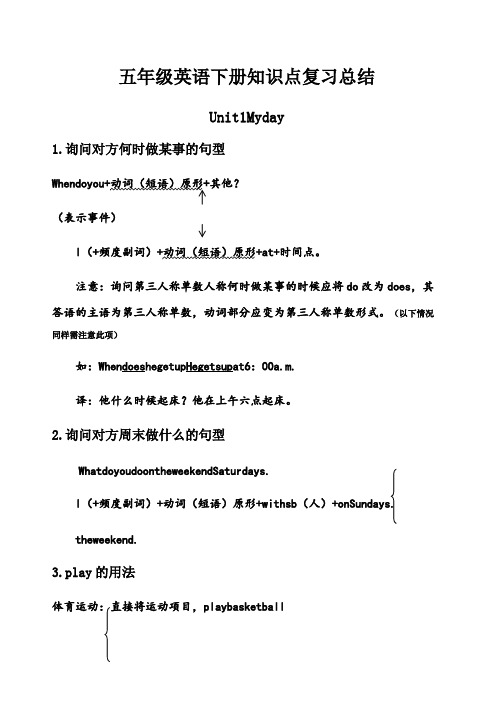
五年级英语下册知识点复习总结
Unit1Myday
1.询问对方何时做某事的句型
Whendoyou+动词(短语)原形+其他? (表示事件)
I(+频度副词)+动词(短语)原形+at+时间点。 注意:询问第三人称单数人称何时做某事的时候应将 do 改为 does,其 答语的主语为第三人称单数,动词部分应变为第三人称单数形式。(以下情况
同样需注意此项)
如:WhendoeshegetupHegetsupat6:00a.m. 译:他什么时候起床?他在上午六点起床。
2.询问对方周末做什么的句型
WhatdoyoudoontheweekendSaturdays. I(+频度副词)+动词(短语)原形+withsb(人)+onSundays. theweekend.
(2)在基数词后加 th:除去 first,second,third,其他基数词变序数词一般 直接在其后加 th。注意 five 与 twelve 要先把 ve 变 f,再加 th;eight 直接加 h;nine 去 e 再加 th。
(3)整十序数词以 ieth 结尾:整十位的序数词先将十位整数词尾的 y 变为 i, 再加 eth。如:twenty-twentieth。
The
注意:play-plays 因为 a 是元音 3)以 ch,sh,s,x 或 o 结尾的动词,在后面加-es; 例如 teach-teacheswash-washesdo-doesgo-goesfix-fixes
4)不规则的; 例如 have-has
5.by 的用法
人教版PEP五年级英语下册各单元语法点

人教版PEP五年级英语下册各单元语法点Unit 1: What Does She Do?- 一般现在时:用于描述日常活动或惯。
主语为第三人称单数时,动词加-s或-es。
- 观察寻找规律:第三人称单数的动词加-s或-es。
- Be动词+动词-ing:用于描述正在进行的动作。
主语为第三人称单数时,be动词用is。
- 一般现在时的否定句:在动词前面加don't/doesn't。
- 一般现在时的疑问句:将do/does置于主语之前。
Unit 2: Can You Run?- Can的用法:用于表示能力和询问对方是否能够做某事。
- Can的否定形式:在can后面加not或缩略形式can't。
- Can的疑问形式:将can置于句首。
Unit 3: What Are They Doing?- 现在进行时:用于描述正在进行的动作。
动词加-ing。
- 现在进行时的否定句:在be动词后面加not。
- 现在进行时的疑问句:将be动词置于句首。
Unit 4: I'm Sitting at the Front.- 介词短语表示地点:用于描述人或物所在的位置。
- 介词on、in、under、behind、in front of、next to等的用法。
Unit 5: What Are You Going to Do?- be going to的用法:表示将来要做的事情。
- be going to的否定形式:在be动词后面加not。
- be going to的疑问形式:将be动词置于句首。
Unit 6: It's Raining!- 祈使句:用于表示请求、命令或建议。
动词原形作谓语。
- 祈使句的否定形式:在动词前面加don't。
- 祈使句的疑问形式:用Do开头。
Unit 7: How Often Do You Exercise?- 表示频率的副词:用于描述动作发生的频率。
- always, usually, often, sometimes, hardly ever, never等的用法。
【专题】五年级下册英语期中考试复习-单元知识点归纳总结Unit1-3-人教pep

人教pep 五年级英语下册期中考试复习单元知识汇总(unit1-unit3)动词:1.take 学习;上(课)2.pick 摘;采集 名词:1.dancing 跳舞;舞蹈2.exercise 活动;运动3.picnic 野餐4.snowman 雪人 四季: 1.season 季节 2.spring 春天 3.summer 夏天 4.autumn 秋天5.winter 冬天 月份:1.January 一月2.February 二月3.March 三月4.April 四月5.May 五月6.June 六月7.July 七月8.August 八月9.September 九月 10.October 十月 11.November 十一月 12.December 十二月1.do morning exercises 做早操2.eat breakfast 吃早饭3.play sports 进行体育运动4.eat dinner 吃晚饭5.go for a walk 散步6.go shopping 去买东西;购物7.clean my room 打扫我的房间8.take a dancing class 上舞蹈课9.have … class 上……课 10.go on a picnic 去野餐 11.go swimming 去游泳 12.pick apples 摘苹果13.make a snowman堆雪人动词:1.start开始2.shop去买东西;购物3.work工作4.need需要5.live居住6.win获胜7.sound听起来好像8.snow雪9.meet集会;开会10.plant种植11.fall落下;(美)秋天12.paint用颜料绘画名词:1.Spain西班牙2.play戏剧;剧本3.letter信4.island岛5.cave山洞;洞穴6.vacation假期7.leaf叶子(复数leaves)8.thing 事情9.trip旅行10.year年11.contest比赛;竞赛12.holiday 假期;节日13.game 游戏14.chocolate 巧克力形容词:te晚的;迟的st上一个的;刚过去的3.busy忙的4.best最;最高程度的5.pink粉色;粉色的6.lovely可爱的;美丽的7.national国家的8.American美国的节日:1.National Day 国庆日2.Thanksgiving 感恩节3.Christmas 圣诞节4.Easter 复活节5.Women’s Day妇女节6.May Day五一国际劳动节7.Mother’s Day母亲节8.Father’s Day父亲节9.Children’s Day儿童节10.Teachers’ Day教师节其它:1.after在(时间)后2.by在……之前3. when什么时候;何时4.why为什么5. which哪一个6. a.m.午前;上午7. p.m.午后;下午8.always,总是;一直ually通常10.sometimes有时11.often经常12.also还;也13.because因为14.all全;完全15.few不多;很少16.RSVP[(尤用于请柬)请赐复]1.watch TV看电视2.eat lunch吃午饭3.go to bed上床睡觉4.go home回家5.go to school去上学6.good job做得好7.a few一些8.sports meet运动会9.the Great Wall长城10.look for寻找1.典型例句:---When do you do morningexercises? 你什么时候做早操?---At 7 o’clock. 七点。
人教版五年级英语下册全册知识点总结
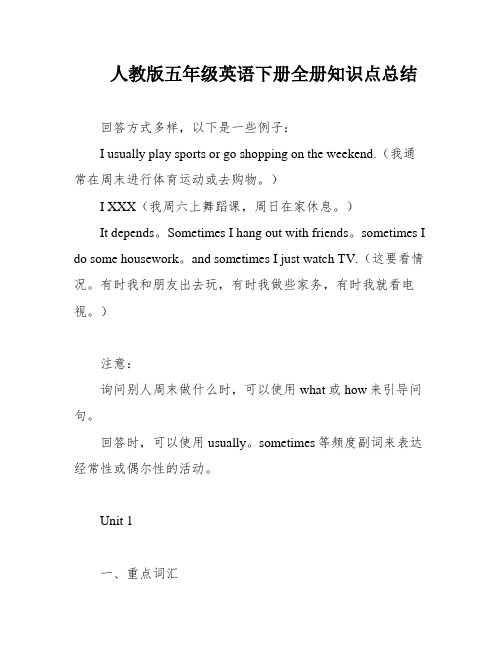
人教版五年级英语下册全册知识点总结回答方式多样,以下是一些例子:I usually play sports or go shopping on the weekend.(我通常在周末进行体育运动或去购物。
)I XXX(我周六上舞蹈课,周日在家休息。
)It depends。
Sometimes I hang out with friends。
sometimes I do some housework。
and sometimes I just watch TV.(这要看情况。
有时我和朋友出去玩,有时我做些家务,有时我就看电视。
)注意:询问别人周末做什么时,可以使用what或how来引导问句。
回答时,可以使用usually。
sometimes等频度副词来表达经常性或偶尔性的活动。
Unit 1一、重点词汇吃早餐:eat breakfast 上······课:have。
class进行体育运动:play sports做早操:do morning exercises 打扫我的房间:clean my room 去购物:go shopping舞蹈:dancing上午:a.m.通常地:usually二、其他日常活动起床:get up上床睡觉:go to bed活动,运动:exercise吃晚饭:eat XXX散步:go for a walk研究,上(课):XXX上舞蹈课:take a dancing class下午:p.m.吃午饭:eat XXX洗脸:XXX洗我的衣服:XXX看电视:watch TV打乒乓球:play ping-pong弹琵琶:play the pipa去游泳:go swimming去跑步:go running做作业:do homework练武术:do XXX踢足球:play football打篮球:play basketball三、语音cl→ [cl]:clean。
(完整版)人教版小学PEP英语五年级下册知识点归纳

人教版小学PEP英语五年级下册知识点归纳PEP五年级英语下册各单元知识点Unit 1 My day一、重点词汇。
1.四会词汇:eat breakfast 吃早饭 have···class 上······课play sports 进行体育运动exercise 活动;运动 domorning exercises做早操eat dinner吃晚饭clean my room 打扫我的房间go shopping 去买东西;购物go for a walk 散步take学习;上(课) dancing跳舞;舞蹈 take a dancing class 上舞蹈课2. 三会词汇:when什么时候after 在(时间)后start 开始usually 通常地;惯常地Spain 西班牙late 晚;迟 a.m. 午前;上午 p.m. 午后;下午why 为什么shop 去买东西;购物work 工作last 上一个的;刚过去的sound 听起来好像also 还;也busy 忙的 need 需要play 戏剧;剧本letter 信live 居住island 岛always 总是;一直cave 山洞;洞穴go swimming 去游泳 win 获胜二、其他日常活动。
get up起床 eat lunch吃午饭 go to bed 上床睡觉wash my face洗脸 wash my clothes 洗我的衣服 watch TV看电视play ping-pong打乒乓球 playthe pipa弹琵琶 go swimming去游泳go running去跑步 do homework 做作业 do kung fu练武术play football踢足球 play basketball打篮球三、频度副词。
always总是,一直(100%) usually通常(80%)often 经常(60%) sometimes(30%)有时四、疑问词。
人教版PEP小学英语五年级下册unit1至unit3知识点归纳
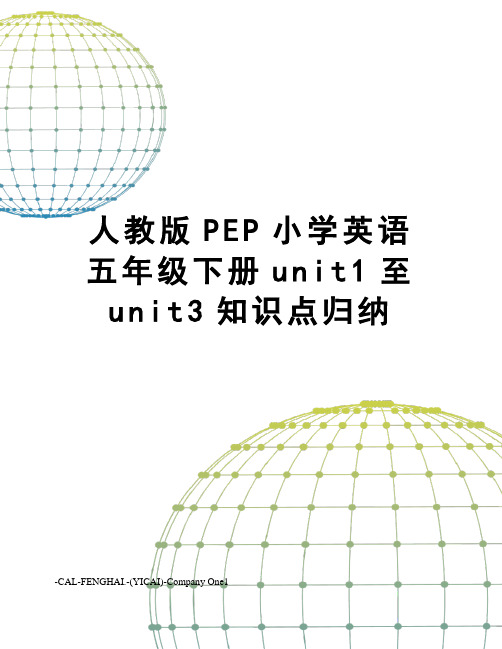
人教版P E P小学英语五年级下册u n i t1至u n i t3知识点归纳-CAL-FENGHAI.-(YICAI)-Company One1五年级下册Unit 1-3重点难点、单元单词、短语和知识点知识梳理第一单元知识点一、主要单词:do morning exercises晨练,做早操 eat breakfast吃早饭 have English class上英语课 play sports进行体育活动 eat dinner吃晚饭 eat lunch吃午饭 climb mountains爬山 go shopping购物,买东西 play the piano弹钢琴 visit grandparents看望(外)祖父母 go hiking去远足二、主要句子:When do you eat dinner你什么时候吃晚饭I eat dinner at 7:00 in the evening.我晚上七点吃晚饭。
When do you get up你什么时候起床I usually get up at 12:00 at noon.我通常在中午12点起床。
What do you do on the weekend你在周末干什么Usually I watch TV and go shopping.我通常看电视和购物。
Sometimes I visit my grandparents.有时候我去看望我的外祖父母。
I often play football.我经常踢足球。
Sometimes I go hiking.有时候我去远足。
三、同义词eat breakfast—have breakfast eat lunch—have luncheat dinner—have dinner play sports—do sports usually—often复数形式:policeman—policemen policewoman—policewomen现在分词:tell—telling三单:say—says同义句:What do you do ---What are you你是干什么的四、表示频度的副词:always总是,一直 usually通常,常常 often经常 sometimes有时候五、以复数形式出现的词组:visit grandparents plant trees介词后跟表示时间的词语时,表示在某年、某月、某个季节,某个时候(在上午,在下午,在晚上)用in;表示在某一天,在星期几用on,在具体的几点几分用at.七、too 和either的用法区别:too和either都是“也”的意思,但too用于肯定句,either用于否定句。
人教版PEP五年级英语下册各单元词汇点
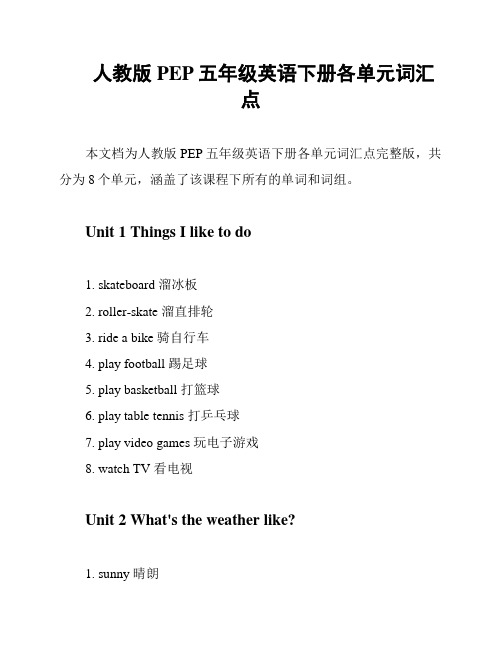
人教版PEP五年级英语下册各单元词汇点本文档为人教版PEP五年级英语下册各单元词汇点完整版,共分为8个单元,涵盖了该课程下所有的单词和词组。
Unit 1 Things I like to do1. skateboard 溜冰板2. roller-skate 溜直排轮3. ride a bike 骑自行车4. play football 踢足球5. play basketball 打篮球6. play table tennis 打乒乓球7. play video games 玩电子游戏8. watch TV 看电视Unit 2 What's the weather like?1. sunny 晴朗2. cloudy 多云3. rainy 下雨4. snowy 下雪5. windy 有风6. hot 热7. cold 冷Unit 3 At a pet shop1. parrot 鹦鹉2. rabbit 兔子3. hamster 仓鼠4. cat 猫5. dog 狗6. fish 鱼7. turtle 乌龟Unit 4 My family 1. grandfather 爷爷2. grandmother 奶奶3. father 爸爸4. mother 妈妈5. older brother 哥哥6. older sister 姐姐7. younger brother 弟弟8. younger sister 妹妹Unit 5 My school day1. classroom 教室2. library 图书馆3. playground 操场4. art room 美术室5. music room 音乐室7. canteen 食堂8. restroom 卫生间Unit 6 Fun with nature1. flowers 花2. grass 草3. trees 树木4. leaves 叶子5. rocks 石头6. mountains 山7. rivers 河流Unit 7 Countryside holidays1. tent 帐篷2. sleeping bag 睡袋3. campfire 篝火4. fishing rod 钓鱼竿5. boat 船6. bike 自行车7. camera 照相机Unit 8 Where's my schoolbag?1. schoolbag 书包2. desk 课桌3. chair 椅子4. blackboard 黑板5. pencil case 铅笔盒6. ruler 尺子7. eraser 橡皮擦以上为本文档的单词和词组列表,希望能够帮助学习人教版PEP五年级英语下册的同学们更好地掌握课程内容。
五年级英语下学期(人教精通版)Unit1-Unit3期中知识点复习资料

人教精通版五年级下册Unit1-Unit3期中知识汇总人教精通版五年级下册unit 1 知识汇总一、词汇library 图书馆 borrow (向某人、从某人)借 borrow books 借书 meeting room 会议室have a meeting 开会welcome 欢迎meet 相遇、开会our 我们的English lesson 英语课language lab 语言实验室science lesson 科学课science lab 科学实验室 we 我们have 有all 所有;全部 like 喜欢very much 非常;很 art club 美术(艺术)俱乐部paint a picture (用颜料)绘画 music club 音乐俱乐部play the piano 弹钢琴many 许多 way 路;道路 please 请also 也;同样二、句子1. Welcome to our school! 欢迎来到我们的学校。
2. We often borrow books from the library. 我们经常从图书馆借书。
3. We’ll show you around our school. 我们会带你参观我们的学校。
4. This way, please. 这边请。
5. This is our science lab. 这是我们的科学实验室。
6. Do you often come to the library? 你经常来图书馆吗?7. How many English lessons do you have in a week? 你们一周有几节英语课?8. How many science lessons do you have in the science lab? 你们在科学俱乐部有几节科学课?9. We have one science lesson in the science lab. 我们在科学俱乐部有一节科学课。
五年级下册英语1到4单元知识点

五年级下册英语1到4单元知识点Unit 1: Holidays and festivals1. Vocabulary:- Holiday: A day when people do not go to work or school because of a special occasion.- Festival: A special time or event when people gather to celebrate something.- Celebrate: To do something special or enjoyable because of a special occasion.- Parade: A public celebration where people walk or drive along a route.- Costume: Special clothes that people wear for a party or festival.2. Grammar:- Present Simple Tense: Used to talk about habits, routines, facts, and general truths.- Adverbs of frequency: (Always, usually, often, sometimes, rarely, never) Used to show how often something happens.- Wh-questions: Questions that start with words like who, what, where, when, why, and how.3. Skills:- Reading: Understand different types of holidays and festivals around the world (e.g., Christmas, Thanksgiving, Chinese New Year).- Listening: Listen to conversations about holiday plans, traditions, and activities.- Speaking: Talk about favorite holidays and festivals and discuss how they are celebrated.- Writing: Write sentences and short paragraphs about holiday customs and traditions.Unit 2: Travelling1. Vocabulary:- Trip: A journey to a place and back again.- Journey: The act of traveling from one place to another.- Route: A way or course taken in getting from a starting point to a destination.- Vehicle: A machine that transports people or goods.- Sightseeing: To visit places of interest in a city or region.2. Grammar:- Present Continuous Tense: Used to talk about actions happening at the moment of speaking.- Imperatives: Commands or orders used to give instructions.- Prepositions of place: (In, on, at, by) Used to show the position or location of something.3. Skills:- Reading: Understand different types of transportation and travel destinations.- Listening: Listen to dialogues about booking tickets, planning trips, and giving directions.- Speaking: Describe travel experiences, ask for information, and give advice about traveling.- Writing: Write emails or postcards describing a recent trip, including details about accommodation, transportation, and sightseeing.Unit 3: Weather and seasons1. Vocabulary:- Weather: The condition of the atmosphere at a particular place and time.- Season: One of the four periods of the year (spring, summer, autumn, winter).- Temperature: How hot or cold the air is.- Forecast: A prediction of the weather in the future.- Sunny, cloudy, rainy, snowy: Different types of weather conditions.2. Grammar:- Present Continuous Tense: Used to talk about temporary actions happening now.- Comparative adjectives: (Bigger, smaller, hotter, colder) Used to compare two things.- Superlative adjectives: (The biggest, the smallest, the hottest, the coldest) Used to compare three or more things.3. Skills:- Reading: Understand the characteristics of each season and how they affect the weather.- Listening: Listen to weather forecasts, descriptions of seasons, and discussions about dressing for the weather.- Speaking: Talk about favorite seasons, describe typical weather in different seasons, and discuss clothing choices for different weather conditions.- Writing: Write short essays about favorite seasons, create weather forecasts, and describe seasonal activities and events.Unit 4: Animals and habitats1. Vocabulary:- Habitat: The natural home or environment of an animal, plant, or other organism.- Endangered: Threatened with extinction or destruction.- Species: A group of living organisms capable of interbreeding.- Predators: Animals that hunt and kill other animals for food.- Herbivores, carnivores, omnivores: Different types of animals based on their diet.2. Grammar:- Present Simple Tense: Used to talk about habits, routines, facts, and general truths.- Countable and uncountable nouns: Countable nouns can be counted (e.g., animals, trees), while uncountable nouns cannot be counted (e.g., water, air).- How much/many: Used to ask about the quantity of something (how much for uncountable nouns, how many for countable nouns).3. Skills:- Reading: Understand different types of animals and their habitats, including endangered species.- Listening: Listen to descriptions of animals, their behaviors, and their relationships with other animals.- Speaking: Talk about favorite animals, habitats, animal conservation, and animal-related activities.- Writing: Write reports about endangered animals, create posters about animal habitats, and describe animal behaviors and characteristics.。
新人教版小学英语五年级下册1-2单元知识点复习
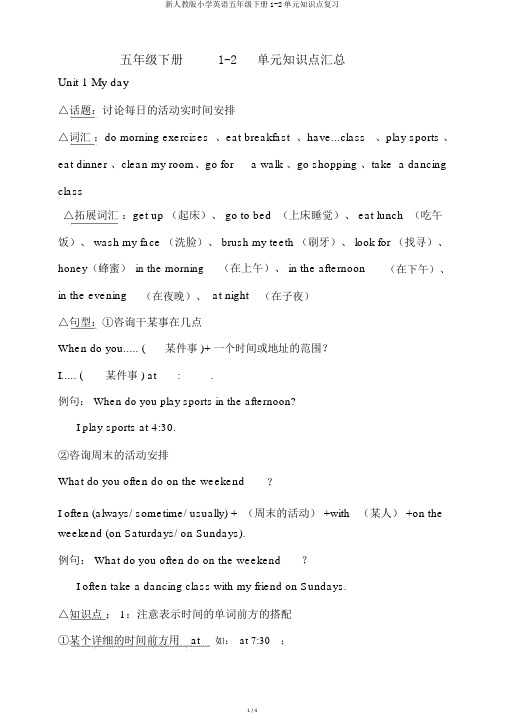
五年级下册1-2 单元知识点汇总Unit 1 My day△话题:讨论每日的活动实时间安排△词汇:do morning exercises 、eat breakfast 、have...class 、play sports 、eat dinner 、clean my room、go for a walk 、go shopping 、take a dancing class△拓展词汇:get up (起床)、 go to bed (上床睡觉)、 eat lunch (吃午饭)、 wash my face (洗脸)、 brush my teeth (刷牙)、 look for (找寻)、honey(蜂蜜)in the morning (在上午)、 in the afternoon (在下午)、in the evening (在夜晚)、at night (在子夜)△句型:①咨询干某事在几点When do you..... ( 某件事 )+ 一个时间或地址的范围?I..... ( 某件事 ) at ___:_____.例句: When do you play sports in the afternoon?I play sports at 4:30.②咨询周末的活动安排What do you often do on the weekendI often (always/ sometime/ usually) +(周末的活动) +with (某人) +on the weekend (on Saturdays/ on Sundays).例句: What do you often do on the weekend?I often take a dancing class with my friend on Sundays.△知识点: 1:注意表示时间的单词前方的搭配①某个详细的时间前方用at如:at 7:30;②在周末 weekend的前方则用 on 而且加 the 如: on the weekend ;但在礼拜几前方用on 而且不加 the 如: on Saturday ;③在 morning 、afternoon 、evening 前方用 in ,而且加 the 如:in the morning ;④在 night前方用at如:at night。
人教版小学五年级下册英语知识点复习
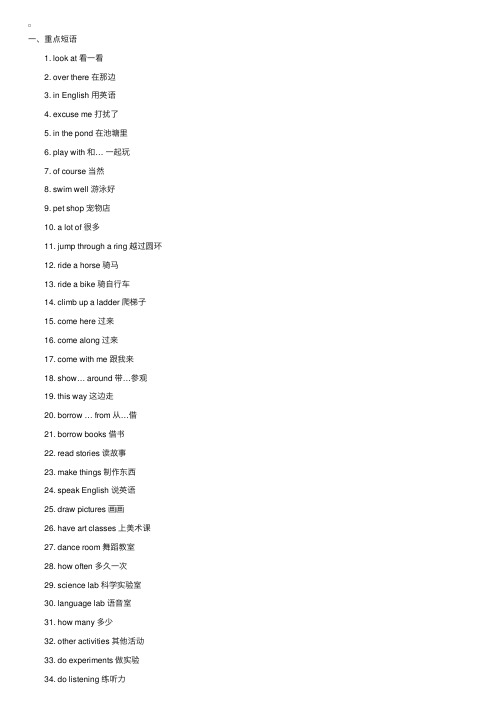
⼀、重点短语 1. look at 看⼀看 2. over there 在那边 3. in English ⽤英语 4. excuse me 打扰了 5. in the pond 在池塘⾥ 6. play with 和… ⼀起玩 7. of course 当然 8. swim well 游泳好 9. pet shop 宠物店 10. a lot of 很多 11. jump through a ring 越过圆环 12. ride a horse 骑马 13. ride a bike 骑⾃⾏车 14. climb up a ladder 爬梯⼦ 15. come here 过来 16. come along 过来 17. come with me 跟我来 18. show… around 带…参观 19. this way 这边⾛ 20. borrow … from 从…借 21. borrow books 借书 22. read stories 读故事 23. make things 制作东西 24. speak English 说英语 25. draw pictures 画画 26. have art classes 上美术课 27. dance room 舞蹈教室 28. how often 多久⼀次 29. science lab 科学实验室 30. language lab 语⾳室 31. how many 多少 32. other activities 其他活动 33. do experiments 做实验 34. do listening 练听⼒ 35. observe things 观察事物 36. do speaking 练⼝语 37. New Year’s Day 元旦 38. meeting hall 会议⼤厅 39. Children’s Day ⼉童节 40. be good at 擅长 41. be interested in 对…感兴趣 42. music club ⾳乐俱乐部 43. no one 没有⼈ 44.play the violin 拉⼩提琴 45. art club 美术俱乐部 46. come into 进⼊ 47.listen to music 听⾳乐 48. cut out 剪下 49. come from 来⾃ 50. up and down 上上下下 51. in groups 成组 52. science corner 科学⾓ 53. group work ⼩组活动 54. do project work 做项⽬制作 55. art corner 美术⾓ 56. computer corner 电脑⾓ 57.play football 踢⾜球 58. be famous for 因…闻名 59. study plants and animals 研究动植物 60. do exercises 做运动 61. on the field 在操场上 62. do printing on the paper 在纸上印刷 63. how about …怎么样? 64.go on field trips ⽥野考察 65. play volleyball 打排球 66. play basketball 打篮球 67. play hockey 打曲棍球 68. play rugby 打橄榄球 69. in the forest 在森林⾥ 70. have a look at 看⼀看 71. here you are 给你 72. how much 多少(钱) 73. a pair of ⼀双;⼀对 74. try on 试穿 75. shoe shop 鞋店 76. clothes shop 服装店 77. make a shopping list 做购物单 78. sports shop 体育⽤品商店 79. cake shop 蛋糕店 80. pay for 付钱 81. feel well 感觉好 82. see a doctor 看医⽣ 83. take good care of 好好照顾 84. have a bad cold 得了重感冒 85. have a fever 发烧 86. have a stomachache 胃疼 87. have a headache 头疼 88. have a toothache ⽛疼 89. have a cough 咳嗽 90. go to a concert 听⾳乐会 91. do maths problems 做数学题 92. go to the music club 去⾳乐俱乐部 93. have to 不得不 94. stay in bed 待在床上 95. get well 康复 96. be worried about 担⼼ 97. don’t worry 别担⼼ 98.help … with 帮助…做某事 99. in the hospital 在医院⾥ ⼆、重点短语讲解 1. play with 和…⼀起玩 play with sb.(某⼈) 和…⼀起玩 play with sth.(某物) 玩某物 e.g. Lucy and Lily are playing with their mother. Lucy and Lily are playing with their doll. 2. a lot of 很多 a lot of = lots of + 可数名词复数或不可数名词 e.g. 同义句转换 There are a lot of apples on the table. = There are ______ ______ apples on the table. (答案:lots of) 3. how often 多久⼀次 how often 是⼀个特殊疑问词,就频率提问。
- 1、下载文档前请自行甄别文档内容的完整性,平台不提供额外的编辑、内容补充、找答案等附加服务。
- 2、"仅部分预览"的文档,不可在线预览部分如存在完整性等问题,可反馈申请退款(可完整预览的文档不适用该条件!)。
- 3、如文档侵犯您的权益,请联系客服反馈,我们会尽快为您处理(人工客服工作时间:9:00-18:30)。
PEP五年级英语下册各单元知识点Unit 1 My day一、重点词汇。
1.四会词汇:··class 上······课 play sports 进行体育运动eat breakfast吃早饭 have·exercise 活动;运动 domorning exercises做早操 eat dinner吃晚饭clean my room 打扫我的房间 go for a walk 散步 go shopping 去买东西;购物take学习;上(课) dancing跳舞;舞蹈 take a dancing class 上舞蹈课2. 三会词汇:when什么时候after 在(时间)后start 开始usually 通常地;惯常地Spain 西班牙late 晚;迟 a.m. 午前;上午 p.m. 午后;下午 why 为什么shop 去买东西;购物work 工作last 上一个的;刚过去的sound 听起来好像 also 还;也 busy 忙的 need 需要 play 戏剧;剧本letter 信live 居住island 岛always 总是;一直cave 山洞;洞穴go swimming 去游泳 win 获胜二、其他日常活动。
get up起床 eat lunch吃午饭 go to bed 上床睡觉wash my face洗脸 wash my clothes 洗我的衣服 watch TV看电视play ping-pong打乒乓球 playthe pipa弹琵琶 go swimming去游泳go running去跑步 do homework 做作业 do kung fu练武术play football踢足球 play basketball打篮球三、频度副词。
always总是,一直(100%) usually通常(80%) often 经常(60%) sometimes(30%)有时四、疑问词。
when什么时候 why 为什么五、重点句型。
1、询问别人什么时候做某事的句型及回答。
句型结构:问:When do you+动词短语原形+其他?(你/你们什么时候做某事?)答:I/We(+频度副词)+动词短语原形+at+具体时间(我/我们通常在几点做某事。
)例:问:When do you go to bed?(你什么时候上床睡觉?)答:I go to bed at 9:00p.m (我晚上9点上床睡觉。
)注意:当主语是第三人称单数(he,she,it,单个人名或单数名词)时,助动词do要变成does,句型结构是:When does+主语(第三人称单数)+动词短语原形+其他?2、询问别人周末做什么的句型及回答。
句型结构:问:What do you do on theweekend?(你周末做什么?)答:I(+频度副词)+动词(短语)+其他。
例:问:What do you do on theweekend?(你周末做什么?)答:I usually read books. (我通常看书。
)注意:当主语是第三人称单数(he,she,it,单个人名或单数名词)时,助动词do要变成does,句型结构是:What does+主语(第三人称单数)+do+on the weekend?六、四会句子:When do you finish class in the morning ? 你们上午的课到几点结束?We finish class at 1 o’clock .我们一点钟结束上午的课。
What do you do on the weekend ? 你周末做什么?I often watch TV and play ping-pong with my father . 我经常看电视,也常和我爸爸一起打乒乓球。
七、语音:cl /kl/ clean clock class cleverpl /pl / plate eggplant please playUnit 2 My favourite season一、重点词汇1. 四会:spring 春天 summer 夏天 autumn秋天 winter冬天 season季节picnic野餐 goon a picnic 去野餐 pick摘;采集 pick apples摘苹果snowman雪人 make a snowman 堆雪人 go swimming去游泳2. 三会:which哪一个 best最;最高程度地snow 雪good job 做得好because 因为vacation 假期all 全;完全pink 粉色;粉色的lovely可爱的;美丽的leaf 叶子(复数leaves)fall 落下;(美式)秋天paint 用颜料绘画二、其他1、形容天气的形容词 hot 炎热的warm暖和的rainy多雨的windy 多风的cold 寒冷的cool凉爽的sunny晴朗的cloudy 多云的snowy下雪的2、由go构成的活动短语go swimming去游泳go shopping去购物 go boating去划船go skating去滑冰 gohiking去远足 go fishing去钓鱼三、重点句型1、询问别人天气怎么样的句型及回答。
句型结构:问:What’sthe weather like+时间+地点?(······天气怎么样?)答:It’s+表示天气的形容词例:问:What’s the weather like in winter in Beijing?(北京冬天的天气怎么样)答:It’s cold and windy.(有风而且寒冷。
)2、询问别人最喜欢的季节句型及回答。
句型结构:问:Which season do you likebest? (你最喜欢的季节是哪一个?)答:I like+季节+best或直接说季节名称。
同义句还有:What’s your favourite season?3、询问别人喜欢某个季节的原因的句型及回答。
句型结构:问:Why do you like+季节名称?或直接用“Why”来提问。
答:一般要用“because”引导的句子来说明理由,可以从天气相关的活动等方面来说。
例:问:Why do you likespring?(你为什么喜欢春天?)答:Because I can fly kites.(因为我能放风筝。
)问:Why do you like summer?(你为什么喜欢夏天?)答:Because I can go swimmingeveryday.(因为我每天都能去游泳。
)问:Why do you like autumn?(你为什么喜欢秋天?)答:Because the weather is cool.(因为天气凉爽。
)问:Why do you like winter?(你为什么喜欢冬天?)答:Because I can make a snowman.(因为我能堆雪人。
)四、四会句子:Which season do you like best , Mike ? 迈克,你最喜欢哪个季节?Winter . 冬天。
Why ?为什么?Because I like summervacation ! 因为我喜欢暑假!五、语音:br /br/ brown library brother umbrellagr /gr/ green grapes grandpa growUnit 3 My school calendar一、重点词汇1.四会:January(Jan.)一月February(Feb.)二月 March(Mar.)三月 April(Apr.)四月May五月 June(Jun.)六月July(Jul.)七月 August(Aug.)八月 September (Sept.)九月October(Oct.)十月 November(Nov.) 十一月 December(Dec.)十二月2. 三会:few 不多;很少 a few一些thing事情meet 聚会;开会 sports meet 运动会 Easter 复活节trip 旅行 year 年plant 种植contest 比赛;竞赛theGreat Wall 长城national 国家的National Day 国庆日 American 美国的Thanksgiving 感恩节Christmas 圣诞节holiday 假日;节日game 游戏 roll 滚动lookfor 寻找 chocolate 巧克力bunny (用作儿语)兔子RSVP (尤用于请柬)请赐复by在...... 之前注意:1、月份的首字母一定要大写。
其他月份单词的缩写形式都2、May没有缩写形式,September的缩写形式是“Sept.”,构成。
是有单词的前三个字母加“·”3、月份的缩写形式不用在句子中,只能单独使用。
4、表示“在几月”时,要在月份单词前面加介词in, 但在几月几日用on。
二、常用节假日名称。
New Year’s Day元旦( 1.1) Tree Planting Day 植树节( 3.12) Easter 复活节愚人节( 4.1)May Day 劳动节( 5.1)April Fool’s DayMother’s Day母亲节(每年五月的第二个星期天)Children’s Day儿童节( 6.1)Father’s Day父亲节(每年六月的第三个星期天)Teachers’ Day教师节(9.10)China’s National Day国庆节(10.1)Mid-Autumn Day 中秋节(农历八月十五)Thanksgiving Day 感恩节(11月第4个周四) Christmas圣诞节(12.25)summer vacation暑假 winter vacation寒假三、活动名称sports meet 运动会 Easterparty 复活节聚会 school trip 学校旅行Chinese test 语文测试 singingcontest歌咏比赛 birthday party生日聚会四、介词in 、on、 at的用法。
1、in后面+上午/下午/晚上/月份/季节/年份。
如:inthe morning, in April, in winter, in 2015.2、on的后面+具体的某一天。
如:onMonday, on April 3rd, on Friday morning.3、at后面+具体的时间点或与其他词构成固定搭配。
如:at six o’clock,at 12:30,at noon.五、重点句型。
